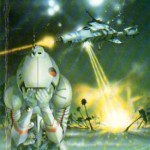
Security Check by Arthur C. Clarke
Security Check by Arthur C. Clarke is a compelling short story classic from one of the masters and a charming example of what archetypal science fiction looks like.

Security Check by Arthur C. Clarke is a compelling short story classic from one of the masters and a charming example of what archetypal science fiction looks like.

While influencing his own works of literature as well as that of other writers, Encounter at Dawn by Arthur C. Clarke stirred many questions about the past and future of humanity.

Readers get to decide for themselves who The Forgotten Enemy really is in this Arthur C. Clarke short story about global disaster and the consequences it has on the survivability of man.

Though pivotal to the plot, the science in Arthur C. Clarke’s Robin Hood, F.R.S. is noticeably dated (nearly sixty years), leaving the reader with questions and doubt rather than the anticipated wonder.

The short story Hide and Seek by Arthur C. Clarke takes two distinctly different stories and blends them together in a cohesive journey that readers can enjoy simultaneously.

Be it film, radio, or just reading the short story, Arthur C. Clarke’s All the Time in the World is a must for every member of fandom to experience.

Heightened by the fears of the unknown, stories within the mysterious confines of space made for colorful entertainment and speculation, and Clarke used this tension to his advantage in Who’s There.

No Morning After is one of those stories by Arthur C. Clarke that you can read over and over and find something new every time.

Into the Comet by Arthur C. Clarke is one of the writer’s many short story looks at futuristic problems where the solutions may come from the most basic of means.

An Ape about the House by Arthur C. Clarke is less about the ape and more about the house. Primates have played an integral part in looking at the human condition over the years, but this story throws a wrench in the debate by simply focusing on the human factor.

Now there are classic science fiction stories, and then there are classic science fiction stories used by educators to introduce young impressionable readers and writers to the age old argument of science and religion. The Nine Billion Names of God by Arthur C. Clarke is THAT kind of story.

Arthur C. Clarke’s short story The Sentinel lost in a writing competion and could feasibly have never made it to publication. But over time, the story emerged as the inspiration for the cult classic 2001: A Space Odyssey.

Recent Comments